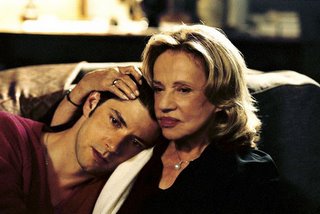 Also from the Boomerang, but without the wretched first sentence.
Also from the Boomerang, but without the wretched first sentence.
The New York times probably put it most dramatically. “The Winner is…only acting gay” is the attention-claiming title of an article published not too long ago, an article that proclaimed a gay revolution. The Guardian, titling this year the “year of the Gay”, is not far behind. So what are these papers so in uproar about? What’s their big point?
Six, no fewer than six movies with gays in them are coming out this fall, count ‘em! No need to worry, though, both articles haste to comfort us, the actors playing them are very much straight. It’s Oscar time, people, and it seems playing gay is this year’s playing disabled, this year’s impressive weight loss or gain. Will the strategy work?
Include dramatic sigh.
Of the New York Times’ big invasion, only one film can be considered mainstream (the film adaptation of the musical Rent). Not only is the renowned newspaper clearly grasping to find a phenomenon to report on, but the angle they put on it is outrageous. Their main point? Playing gay is only accepted, nay, only possible, if the actor’s sexuality is decidedly “normal”.
Take Heath Ledger in what I confess to have called, like so many others, “the gay cowboy movie”, Brokeback Mountain. If we believe the New York times, the only way we can appreciate this love story between two men is because we know that Heath is a manly man in real life, who’s even knocked up his on- and offscreen wife/girlfriend, Michelle Williams. The Guardian goes so far as to suggest she’s been cast merely as a “sexual alibi”. And of course the fact that Peter Sarsgaard, who portrayed gay characters in several films, “appears in gossip columns linked with Maggie Gyllenhaal” is crucial. How ridiculous their point is, is best seen when using their own words: “Our awareness of these nonfiction roles makes it easier and maybe more acceptable for middle-class heterosexual viewers - a group that does, after all, include most of us in the audience - to embrace characters whose sexual preferences we don't share.”
Bollocks.
It just makes you want to flee to France, where they – at least on film, and in film criticism- have a more relaxed way of dealing with the subject. Take François Ozon, for example, one of France’s most prolific and interesting directors at the moment. The main character in his new film, , “Le Temps qui Reste” (the time that remains) is gay, and dying. In any American film, his illness would have been Aids. In this film, he gets cancer. Admittedly, this is necessary for a later plot point, but still: it shows that to this director and writer, the sexual orientation of this character is not the only thing that’s important. Despite some rather graphic scenes (yes, this is what my mother and I do for quality time) the film might not have been all that different had the main character been straight.
For all the above, but also for the beautiful music by Arvo Pärt, for the astounding cinematography, for the chance to see Jeanne Moreau shine on screen again, for some scenes that really worked, I would love to proclaim this film a masterpiece. Unfortunately, it isn’t.
It’s a pity really. Some parts here work beautifully, other almost do, but as a whole the film is ultimately unsatisfying. It charts what happens to beautiful, arrogant and yes, gay, photographer Romain after he finds out he only has a month or two to live. He pushes everyone away, his family, his boyfriend, and tells only his grandmother (Moreau) what’s going on. He goes to a darkroom. He sees himself as a kid. He has a conversation with a waitress in a diner who thinks he’s beautiful. In the end, Ozon returns to his fascination with beaches and lets his story end.
As the summary above, the film feels to episodic, too aimless. There are some nice moments with the boyfriend, and the short segment with his grandmother is wonderfully worked out, but in the end we have no insight whatsoever into his relationship with his family, with his sister especially. We don’t know why he reacts the way he does, why he shuts everyone out. We spend a whole movie with this man, but while it would take me a long time to grow weary of watching the beautiful Melvil Poupaud, we ultimately get no insight into who he is. As an exploration of death and how people deal with it, Ozon’s own “Sous le Sable” is a much better film, and it’s a pity, because this one shows the potential to be just as great.
Do actors win Academy Awards just for morphing, for once not their appearance, but their sexuality? Is Philip Seymour Hoffman a contender for best Actor this year because despite their differences in statures and physique he managed to embody who and how Truman Capote was, or because Truman happened to be gay? Until the media starts growing up and out of its jitterish and exalted treatment of homosexuality, it will be hard for movies that feature homosexual protagonists to be judged on their own merits.


No comments:
Post a Comment